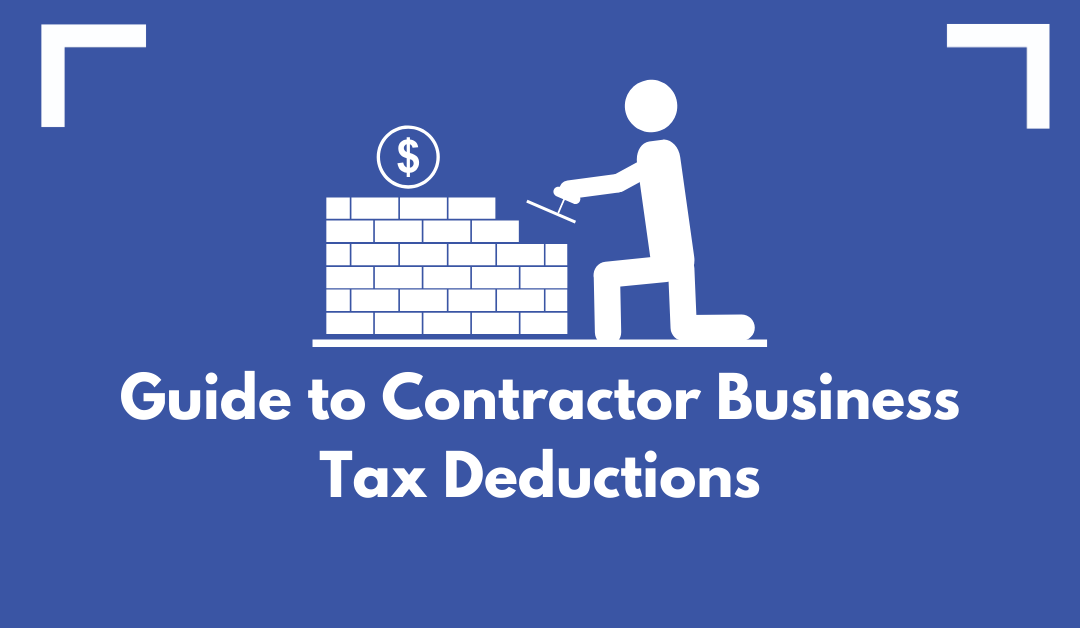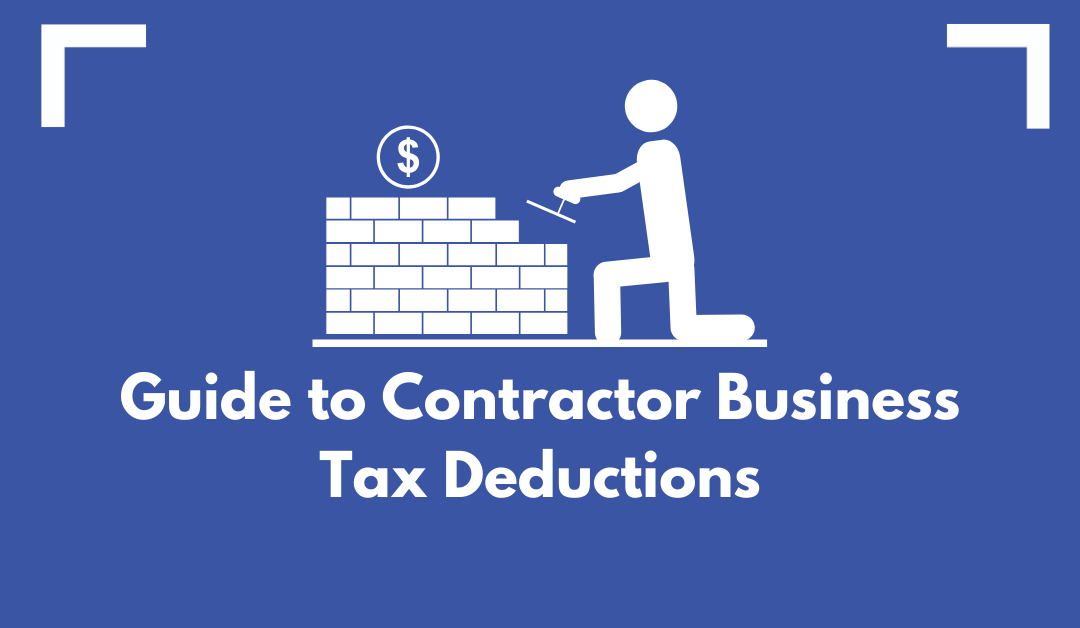Figuring out your contractor business tax deductions and what expenses can be claimed on your business can cause incredible confusion with all of the different rules that apply to different types of expenses.
Expenses for a contractor business can be claimed against your assessable income to offset and reduce your tax liability. But there are certain things you may or may not know when it comes to claiming business deductions that can affect the eligibility of your claims.
In this guide, we cover exactly what you need to know regarding expenses as a contractor business.
Contents
- 1 What is Business Assessable Income?
- 2 Exclusions from your Business Assessable Income
- 3 What Can You Claim as a Business Tax Deduction for Contractors?
- 4 What Can’t You Claim as a Business Tax Deduction for Contractors?
- 5 When Can You Claim As a Business Tax Deduction?
- 6 Prepaid Expenses for Business Tax Deductions
- 7 How To Claim Business Tax Deductions
- 8 Recordkeeping your Expenses
- 9 Motor Vehicle Expenses
- 10 Home-Based Business Expenses
- 11 Business Travel Expenses
- 12 Wages and Super Contributions Expenses
- 13 Repairs, Maintenance & Replacement Expenses
- 14 General Business Operating Expenses
- 15 Depreciation Assets and Capital Expenses
- 16 Key Takeaways
What is Business Assessable Income?
Firstly, it’s important to understand what constitutes a business assessable income when it comes to your contractor business – if you’re carrying on a business, then the income you receive is generally assessable for income tax purposes. The total amount that you receive is called assessable.
This can include the following:
- All gross income (before tax) as a result of everyday business activities. Note that gross income does not include GST
- All other business income that is not a result of your business activities such as trading of stock, capital gains and cash prizes won by your business
Exclusions from your Business Assessable Income
The following does not apply as assessable income for income tax purposes:
- Gifts or inheritances
- GST collected
- Loans and borrowed money
- Money contributed by the business owner
- Earnings from a personal hobby or prizes won that are not related to the business
What Can You Claim as a Business Tax Deduction for Contractors?
Now that we understand what a business assessable income is, the next step is to understand what you can and can’t claim. There are generally three simple rules that the ATO uses to determine whether your claim is valid:
- The expense must have been for the purpose of your business rather than personal use
- In the case that the expense is for mixed-use purposes, you can only claim the business portion
- You must possess records to prove the above
For example, the purchase of a car solely for business use means you can claim a deduction on the full purchase price of the vehicle. However, if you are using it for both personal and business use, you can only claim the portion you use it for your business. If the car is used 70% of the time for the business, then you can only claim 70% of the amount as a deduction.
What Can’t You Claim as a Business Tax Deduction for Contractors?
There are some specific expenses that are not deductible at all:
- Entertainment expenses
- Traffic penalties and fines
- Personal or domestic expenses such as clothing for the family and childcare fees
- The GST portion of the expense if you are claiming it as a GST credit on your BAS (business activity statement)
When Can You Claim As a Business Tax Deduction?
There are two types of expenses – operating expenses or capital expenses. Depending on the type of expense, different claim periods apply:
- For operating expenses (wages or rent), the expense can be claimed in the year they were incurred
- For capital expenses (machinery or equipment replacement), the expense must be claimed over a longer period
Prepaid Expenses for Business Tax Deductions
In the case that you have paid in advance for an expense that you are yet to receive in full or partially, a threshold of $1,000 applies.
For expenses equal or over $1,000, you will need to apportion the expense if the item or service is not received in full within 12 months or it is not eligible for an immediate deduction (as above).
How To Claim Business Tax Deductions
Your business structure will influence how you claim your business deduction. See below:
- Sole trader – all business tax deductions claimed on your individual tax return under the ‘Business and professional items’ schedule either completed by yourself or with a registered tax agent
- Partnership – all business tax deductions claimed in your partnership tax return
- Company – all business tax deductions claimed in your company tax return
- Trust – all business tax deductions claimed in your trust tax return
You might also be interested in our article on the Difference Between Employees vs. Contractors
Recordkeeping your Expenses
As a legal requirement, you must keep records of all transactions concerning your tax and superannuation for the duration that you are operating your business. This means that expenses must all be recorded at the time that they are incurred or purchased.
For more information, visit the ATO website detailing the exact requirements of record keeping.
Motor Vehicle Expenses
As a business owner, you are eligible to claim a tax deduction for expenses for motor vehicles used in running your business – types of vehicles may include cars, motorcycles or other vehicles designed to carry nine passengers or more; or to carry one tonne or more such as a truck or van.
You can claim:
- Fuel costs
- Repairs and servicing costs
- Maintenance costs
- Interest owed on the vehicle loan
- Insurance premiums related to the vehicle
- Payments on any lease agreements for the vehicle
- Registration costs
- Depreciation
For mixed-use (personal and business) cases, a logbook or diary to record private and business travel is required.
Note – travel between home and place of business is not considered a business expense unless your business is home-based and the trip is for business purposes such as meetings or conferences.
There are various methods for calculating vehicle expenses depending on your business structure. For more information, visit this ATO page.
Home-Based Business Expenses
A home-based business is considered your primary place of business where there is a space set aside exclusively for business activities. There
If your business is operated partially or in full at home, you can claim business tax deductions in the following categories:
- Occupancy expenses such as rent or mortgage interest, house insurance premium coverage, council rates or land tax
- General running expenses such as utility costs, depreciation of plant and equipment, repair costs and cleaning
- Motor vehicle expenses between your home and other places of business if the purpose of travel is for business reasons
Your business can either be run at home or from home. For example, a doctor who uses part of his home as his surgery runs this at home, with patients coming to their home for consultations. An electrician performs work on clients’ premises but all administration and storage of equipment are stored at home.
If you partially use your home as your principal place of business, you may still able to claim a portion of your deduction for expenses relating to the space you use.
To find out how to calculate these claims, visit this ATO page for more information.
Business Travel Expenses
For all travel that is required for business purposes, you can claim a tax deduction on it. A travel diary must be maintained for sole traders and partners in a partnership when recording overnight business travel expenses. For all other business structures, it is highly recommended but not compulsory.
The diary must include:
- Description of the activity
- Date and approximate time the business activity began
- The duration of the business activity
- Name of locations where the business activity took place
Records for five years are required to be kept and include tax invoices/receipts, boarding passes, tickets and methodology for calculating the portion of expenses for mixed-use situations.
What business travel expenses can be claimed
Expenses for the purpose of business travel that can be claimed include:
- Airfares
- Public transport or ride-sharing fares
- Car rental fees and all costs incurred for the use of business travel
- Accommodation
- Meals while away overnight
You must also prove that you have a permanent principal residence elsewhere that requires you to stay away from your home overnight.
What business travel expense can’t be claimed
Expenses that cannot be claimed include:
- Personal holiday or visiting family/friends when combined with business travel
- Costs associated with a family member joining the business trip
- Souvenirs and gifts purchased during the business trip
- Sightseeing and entertainment costs during the business trip
- Visas, passports or travel insurance fees
- Travel before starting to run your business
Wages and Super Contributions Expenses
Many contractor businesses also hire employees to assist with their business operation. If this case applies to you, you can claim business tax deductions for salaries and wages you pay to your employees; and super contributions that you make for employees and contractors (where applicable).
Sole traders may claim deductions for their own super contributions on their personal tax return.
Sole Traders & Partnerships
Business owners cannot pay themselves a salary or wage for the purposes of claiming it as a tax deduction. This is considered a distribution of profit.
Companies & Trusts
A deduction can be claimed for any salaries or wages paid to yourself or other employees.
Repairs, Maintenance & Replacement Expenses
Expenses related to costs incurred for repairs, maintenance or replacement of tools used to produce business income can be claimed as a tax deduction. Capital expenses are not eligible to be claimed as a tax deduction.
What can be claimed
- Plumbing including repairs to leaks
- Electrical repairs
- Replacement of broken parts
- Machinery repair costs
- Painting
This can also be claimed if you are renting the property where your business activity occurs.
What can’t be claimed
- Significant improvements to a property or item
- Repairs made to plant and equipment/tools immediately after purchasing them
General Business Operating Expenses
These may include:
- Purchase of stock and its associated delivery charges
- Marketing and advertising costs
- Legal expenses
- Bank fees and charges
- Interest on loans and money borrowed
- Stationery costs
- Ongoing online costs such as maintaining a website and an internet connection
- Software subscription fees
- Waste removal
- Parking fees excluding parking penalties
- Insurance premiums
- Clothing expenses
- Educational and qualification costs
- Union and professional association fees
Depreciation Assets and Capital Expenses
Small businesses can trade under the simplified small business depreciation rules. Read our guide on small business depreciation.
Key Takeaways
There’s an incredibly vast array of expenses that you can claim as a contractor business – much of this boils down to your business structure and what types of business activities are involved in running your business. We find that by understanding what you can and can’t claim, this ensures you can make the appropriate decisions to ensure you are maximising your business tax deductions where possible. While we don’t recommend that you decide to incur an expense to claim it as a deduction, there will be certain situations that can provide a beneficial outcome to your tax liability by simply being aware of the parameters around claiming a particular expense.
Fortunately, tax agents such as us are professionally trained and do this for a living. Our expertise ensures that you can maximise the effectiveness of business tax deductions so that your business can enjoy increased profits while still legally meeting your tax obligations. If you are interested in having your business assessed and potentially reducing your tax liability, simply book a FREE consultation with us or give us a call to discuss your situation.
Sign up to our monthly newsletter using the form below where we share exclusive small business and contractor advice!
Disclaimer:
Please note that every effort has been made to ensure that the information provided in this guide is accurate. You should note, however, that the information is intended as a guide only, providing an overview of general information available to contractors and small businesses. This guide is not intended to be an exhaustive source of information and should not be seen to constitute legal or tax advice. You should, where necessary, seek your own advice for any legal or tax issues raised in your business affairs.



